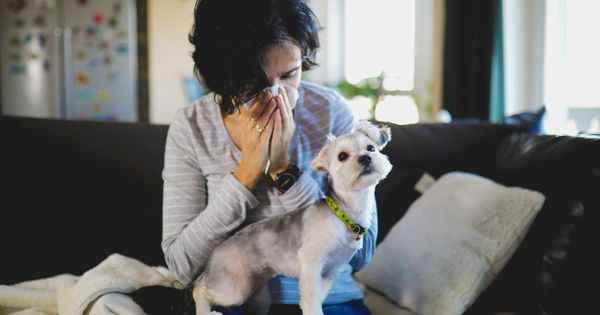Posted ,
Reading 2 mins.
According to a study published by Japanese researchers, the allergen responsible for more than half of allergies caused by dogs has been discovered. From there to imagining that a vaccine could be developed, there is only one step…
Are we heading towards the end of dog allergy? For the moment, people with allergies are relying on taking antihistamines or undergoing desensitization treatment to accustom their immune system. But medicine may well put an end to symptoms such as sneezing or runny nose. Indeed, Japanese researchers are currently working to develop a vaccine for people allergic to canines. The results are published in the scientific journal “The Febs Scientits“.
Seven allergens discovered and one responsible for the majority of allergies
As research progressed, specialists were able to identify the seven allergens present in dogs. These seven allergens are baptized “Canis familiaris” and numbered from Can f 1 to Can f 7″. One of them represents 50 to 75% of allergies worldwide.
This is “Can f 1″, present in the tissues of the tongue, the salivary glands and the skin of our canine friends. Its molecules”bind to an antibody and produce an exceptionally strong immune response when they would normally be harmless“, explain the researchers from the University of Osaka in a press release.
A vaccine within the reach of scientists
Thanks to x-ray crystallography, the researchers were able to fully map Can f 1 and thus isolate the different epitopes, molecules that the body must know how to fight or accept (depending on whether these molecules are its own or foreign).
If this is an important first step for the development of a vaccine, it will still be necessary to be patient. The researchers want to be optimistic, assuring that a vaccine against dog allergy “is within our reach”.
Hypocat for cats
Moreover, this type of vaccine is not new. Already in 2019, researchers at the University of Zurich, Switzerland, developed a vaccine against allergies caused by cats. This vaccine for felids, called Hypocat, would be able to neutralize in cats the protein responsible for allergies in humans. But if this type of treatment seems promising, specialists remain cautious.
Consult an allergist online
Results that remain to be confirmed in practice
Indeed, as Professor Antoine Magnan, pulmonologist specializing in asthma and allergies, explains to our colleagues from Paris: “I will not give too much hope to allergy sufferers who dream of having a cat at home. While it’s scientifically very pretty, the clinical application is very limited.”. The allergist Habib Chabane even points out that the study “has several limitations that prevent the vaccine from being considered truly effective”.
So even if a vaccine against dog allergies sees the light of day, there is currently no guarantee that it will work.
